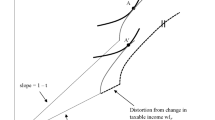Abstract
Bunching is said to occur if individuals with different characteristics receive the same commodity bundle. This article analyzes bunching in a finite population optimal nonlinear income tax problem. Several easily-computed sufficient conditions for the optimality of particular bunching patterns as well as a simple necessary and sufficient condition for the optimal allocation to exhibit no bunching are presented. In addition, a characterization of the optimal allocation is provided. Is is shown that the bunching pattern obtained by S. Lollivier and J.-C. Rochet is a consequence of a convexity condition which is automatically satisfied in their continuum model but which is not generally satisfied in a finite model.
Similar content being viewed by others
References
Baron DP, Myerson RB (1982) Regulating a monopolist with unknown costs. Econometrica 50:911–930
Cooper R (1984) On allocative distortions in problems of self-selection. Rand J Econ 15:568–577
Guesnerie R, Laffont J-J (1984) A complete solution to a class of principal-agent problems with an application to the control of a self-managed firm. J Public Econ 25:329–369
Guesnerie R, Seade J (1982) Nonlinear pricing in a finite economy. J Public Econ 17:157–179
Lockwood B (1985) Non-linear pricing and the exclusion of consumers. Econ Lett 18:313–316
Lollivier S, Rochet J-C (1983) Bunching and second-order conditions: A note on optimal tax theory. J Econ Theory 31:392–400
Maskin E, Riley J (1984) Monopoly with incomplete information. Rand J Econ 15:171–196
Mirrlees JA (1971) An exploration in the theory of optimum income taxation. Rev Econ Studies 38:175–208
Mussa M, Rosen S (1978) Monopoly and product quality. J Econ Theory 18:301–317
Myerson RB (1981) Optimal auction design. Math Oper Res 6:58–73
Seade JK (1977) On the shape of optimal tax schedules. J Public Econ 7:203–235
Seade J (1980) Optimal non-linear policies for non-utilitarian motives. In: Collard D, Lecomber R, Slater M (eds) Income distribution: The limits to redistribution. Scientechnica, Bristol, pp 53–68
Weymark JA (1986) A reduced-form optimal nonlinear income tax problem. J Public Econ (in press)
Weymark JA (1985) Comparative static properties of optimal nonlinear income taxes. Discussion Paper No. 85-02, Department of Economics, University of British Columbia (revised 1986)
Author information
Authors and Affiliations
Additional information
Discussions with Steven Matthews and Dilip Mookherjee and the comments of two anonymous referees have been extremely helpful. The hospitality of the Center for Mathematical Studies in Economics and Management Science at Northwestern University and the research support of the Social Sciences and Humanities Research Council of Canada are gratefully acknowledged.
Rights and permissions
About this article
Cite this article
Weymark, J.A. Bunching properties of optimal nonlinear income taxes. Soc Choice Welfare 3, 213–232 (1986). https://doi.org/10.1007/BF00433536
Received:
Accepted:
Issue Date:
DOI: https://doi.org/10.1007/BF00433536




